Turkish Beverages: Basic Overview
Common Ingredients
Common Preparing Methods
Key Taste
Drinking Etiquette
Culinary Festivals
Influence and Fusion
Classifications of Turkish Beverages
-
Alcoholic Beverages
In Turkey, alcoholic drinks showcase a blend of traditional flavors and brewing methods.
Signature offerings include an anise-flavored spirit, known for its milky transformation when mixed with water, symbolizing purity and enjoyed in social settings.
The beer scene is dominated by a leading brand offering a range from classic lagers to darker, richer varieties, essential at gatherings and casual meetings.
These alcoholic options embody Turkish hospitality and cultural traditions
-
Non-alcoholic Beverages
Turkish non-alcoholic drinks range from spicy fermented beverages to sweet, aromatic sherbets, catering to various tastes and occasions.
Popular choices include a cooling yogurt-based drink for summer and warm, comforting beverages like orchid tuber-based drinks for winter.
Fruit juices and lemonades offer fresh, natural alternatives, reflecting the diversity and adaptability of Turkish culinary traditions to different seasons and regions.
Turkish beverages are drinks widely savored in Turkey, a country that belongs to Western Asia, known for its rich cultural heritage and diverse culinary traditions.
These beverages range from traditional alcoholic drinks to unique non-alcoholic refreshments, each with its own history and cultural significance.
One of the most iconic Turkish alcoholic beverages is Rakı, often referred to as Turkey’s national drink. It is a strong, anise-flavored spirit that plays a significant role in Turkish food and drinking culture, particularly as a symbol in many of the country’s cities.
Turkish coffee is another hallmark of Turkey’s beverage culture. Prepared in a unique style without filtering, this very finely ground coffee is boiled in a special pot and served in small cups, often with a side of something sweet like Turkish delight.
The preparation and serving of Turkish coffee are steeped in tradition, contributing to its special place in Turkish social and cultural life.
In addition to exploring the well-known drinks of Turkey, you have the opportunity to delve into the nation’s customary drinking habits, the worldwide acclaim of Turkish drinks, and the harmonious relationship between Turkish beverages and their culinary counterparts.
16 Popular Turkish Beverages with Filters
Discover the most beloved Turkish beverages, carefully curated in a list of 16 options sorted by their popularity. This comprehensive guide features advanced filters to refine your search, allowing you to sort by popularity, ingredients, tastes, and preparation methods.
Whether you’re interested in traditional, national, street beverages, or fusion, this guide makes it easy to navigate the rich tapestry of Turkey’s drink offerings.
Turkish Tea
- Non-Alcoholic
- Street Beverages
- Traditional
Turkish Tea is a traditional beverage deeply ingrained in the social and cultural fabric of Turkey, known for its distinctive preparation and consumption style. It is a national drink that symbolizes hospitality and friendship, often served in tulip-shaped glasses to enhance its aroma and taste.
Turkish tea is primarily grown in the Rize Province, which benefits from a mild climate and fertile soil, making it the heartland of tea production in the country. The tea culture in Turkey extends beyond mere consumption, playing a significant role in social gatherings and daily life.
While Turkish tea itself does not have widely recognized variations like some other beverages, the way it is brewed and served—strong, light, or in between—can vary from one household to another.
Turkish Coffee
- Non-Alcoholic
- Street Beverages
- Traditional
Turkish coffee is a traditional beverage of Turkish cuisine, known for its unique preparation method where very finely ground coffee beans are boiled in a special pot without filtering.
This coffee is famous for its strong and distinctive flavor, often enhanced with sugar or spices like cardamom. It is traditionally served in small cups and is a significant part of Turkish cultural rituals, especially in weddings and hospitality.
Turkish coffee has various sweetness levels, from unsweetened to very sweet, catering to different palates.
Ayran
- Non-Alcoholic
- National
- Street Beverages
- Traditional
Ayran is a traditional Turkish beverage known for its refreshing qualities, especially popular during the hot summer months. It is made by mixing yogurt with water and a pinch of salt, sometimes garnished with mint for an extra refreshing touch.
Ayran is considered a national drink in Turkey and is often served alongside grilled meats or rice dishes. While Ayran itself is quite straightforward, variations in its preparation can be found across different regions, adjusting the thickness or the amount of salt and mint to taste.
Rakı
- Alcoholic
- National
- Traditional
Rakı is a traditional Turkish spirit known for its strong anise flavor, making it a national beverage deeply embedded in Turkish culture. It is typically served with chilled water, which turns it a milky white color, earning it the nickname “lion’s milk.”
This transformation is a cherished part of the rakı drinking experience, symbolizing purity and transformation. Rakı is often consumed alongside meze, small dishes of food, in a social setting that fosters conversation and camaraderie.
There are various brands and types of rakı, each with its unique characteristics, but the classic grape-based rakı remains the most cherished. Rakı is integral to many social gatherings and celebrations in Turkey, embodying the spirit of Turkish hospitality and communal life.
Efes Pilsen
- Alcoholic
- Fusion
Efes Pilsen, now known as Anadolu Efes, is a prominent beer brand that is an integral part of modern Turkish beverage culture. It is a fusion drink, combining traditional brewing techniques with contemporary flavors to cater to a wide audience.
Efes Pilsen is known for its variety of beer types, including the classic Efes Pilsen lager, Efes Dark (a richer, maltier option), and Efes Light, catering to those preferring a lighter beer.
The brand has become synonymous with social gatherings and is often enjoyed in casual settings, making it a popular choice among locals and tourists alike.
Şalgam Suyu
- Non-Alcoholic
- Street Beverages
- Traditional
Şalgam suyu, or turnip water, is a traditional Turkish beverage made from the fermentation of purple carrot and turnip, seasoned with various spices.
Originating from the southern regions of Turkey, such as Adana and Mersin, Şalgam Suyu is a staple street drink known for its tangy and spicy flavor profile.
It is commonly consumed alongside meals, especially kebabs, and is often paired with rakı, an alcoholic anise-flavored drink. It holds a significant place in Turkish culinary culture and is celebrated at the Şalgam Festival in Adana, highlighting its cultural importance.
Sherbet
- Non-Alcoholic
- Traditional
Sherbet is a traditional Turkish beverage that comes in a variety of flavors, made from fruits, flowers, or herbs mixed with sugar and water.
This sweet and often colorful drink is not just a refreshing choice for hot days but also plays a part in cultural and religious events, such as Ramadan, where it’s commonly served to break the fast.
Famous variations include rose, lemon, tamarind, and pomegranate sherbets, each offering a unique taste experience.
Limonata
- Non-Alcoholic
- Street Beverages
- Traditional
Limonata is a classic and refreshing Turkish lemonade deeply rooted in Turkish cuisine. This drink is crafted from fresh lemons, sugar, and water, with optional mint leaves for an added twist.
Its preparation involves a unique process where lemon rinds and sugar are combined, either by rubbing together or cooking, before being mixed with lemon juice, resulting in a smooth, sweet flavor without the typical sourness of lemonades.
Limonata stands out for its natural, zesty taste, offering a healthier alternative to commercial soft drinks, and is especially popular during the warm summer months in Turkey.
Limonata is often served in cafes and restaurants across the country and enjoyed for its refreshing qualities.
Salep
- Non-Alcoholic
- Street Beverages
- Traditional
Salep is a traditional Turkish beverage made from the flour of orchid tubers, offering warmth and nourishment, especially during the cold months.
It is a beloved winter drink in Turkey and parts of the former Ottoman Empire, cherished for its creamy texture and subtle sweetness, often enhanced with cinnamon and other spices.
Salep’s popularity extends beyond Turkey, enjoyed in various forms across the Middle East and neighboring regions. While salep is not specifically associated with any festivals, its consumption is a cherished ritual during winter, providing warmth and comfort.
The demand for authentic salep has led to concerns about the sustainability of wild orchids, prompting efforts to protect these plants and encourage sustainable practices.
Boza
- Non-Alcoholic
- Traditional
Boza is a traditional fermented beverage of Turkish origin, known for its thick consistency and slightly acidic sweet flavor. Made from fermenting various grains like maize and wheat, it is a popular drink with a rich history dating back to Central Asia and the Ottoman era.
Boza is famous for its unique variations, including those with different levels of sweetness and thickness, catering to diverse palates. It is a popular winter drink in Turkey, enjoyed for its warming and comforting qualities.
Kefir
- Non-Alcoholic
- Traditional
Kefir is a traditional fermented milk drink that is a staple in Turkish cuisine. It is known for its tangy taste and slightly effervescent texture, making it a unique and refreshing beverage.
It is made by adding kefir grains to milk, which initiates the fermentation process. This drink is rich in probiotics and is believed to offer various health benefits, including digestive health and immune support.
Kefir has several variations, including those made from different types of milk such as cow, goat, or sheep milk, each offering a distinct flavor profile.
Pomegranate Juice
- Non-Alcoholic
- Street Beverages
- Traditional
Pomegranate juice is a beloved drink in Turkey, known for its deep, ruby-red color and a perfect balance of sweet and tart flavors.
It’s not only enjoyed on its own but also used as a key ingredient in cooking, especially in the form of pomegranate molasses, which adds a tangy depth to various dishes.
Şarap
- Alcoholic
- Traditional
Şarap, or Turkish wine, is a significant part of Turkey’s culinary landscape, reflecting the country’s rich history in viticulture.
Turkey’s diverse climate and geography contribute to a wide variety of wine types, with the country being home to numerous indigenous grape varieties, though only a fraction are used commercially.
Turkish wine production spans across several regions, each offering distinct flavors and characteristics. Notable wine-producing areas include Thrace, known for its elegant wines, and the Aegean coast, which produces wines with Mediterranean influences.
Eastern and Central Anatolia also contribute to the country’s wine diversity, despite the climatic challenges. Turkish wines include both traditional varieties like Öküzgözü and Boğazkere, as well as international grapes that have found a new home in Turkey.
Kurdish Coffee
- Non-Alcoholic
- Traditional
Kurdish coffee, also known as menengiç coffee, is a traditional drink in Kurdish and Turkish cuisines, made from roasted and ground terebinth fruits, which are related to pistachios.
This caffeine-free beverage is popular in Southeastern Anatolia and is known for its unique, nutty flavor. It has been a part of the region’s culinary tradition for over a century and is sometimes available as a branded product in an oily paste form.
Yayık Ayranı
- Non-Alcoholic
- Traditional
Yayık ayranı is a traditional variant of ayran, distinguished by its production method using fermented butter making by-products.
This drink, also known as Turkish buttermilk, is not as widely available commercially due to its artisanal nature, typically found in local markets rather than in large-scale retail outlets.
Yayık ayranı is made from churned soured yogurt, water, and salt, and is known for its distinct sour taste, which comes from the longer fermentation of the yogurt used in its production. It is a traditional drink, mostly produced in rural areas for domestic consumption.
Lohusa Şerbeti
- Non-Alcoholic
- Traditional
Lohusa Şerbeti is a traditional Turkish beverage, often associated with the postpartum period, as it is traditionally given to women after childbirth. This sweet, red drink is made from water, sugar, cinnamon, cloves, and red food coloring.
Over time, it has also become a drink shared with visitors and friends, expanding its consumption beyond its original purpose.
How Do Turkish Beverages and Dishes Complement Each Other?
Here’s how some popular Turkish dishes are often paired with beverages to enhance the dining experience:
Each of these pairings showcases the thoughtfulness in this cuisine, where every sip and bite is meant to either complement or contrast flavors of dishes from Turkey for a harmonious dining experience.
Hopefully, after reading this article, you can plan your next trip to Turkey and see how magnificent their culture, food, and drinks are.
If you like this article, please don’t forget to leave a thumbs up. And share this on your social media so other people can learn more about Turkish drinks. As always, have a great day!





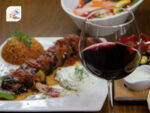

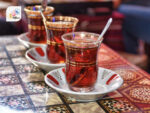
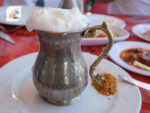

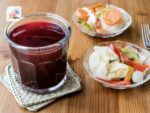

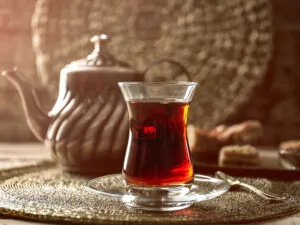



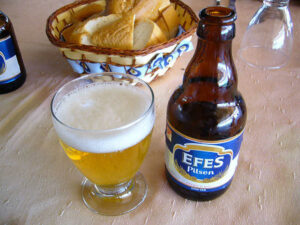
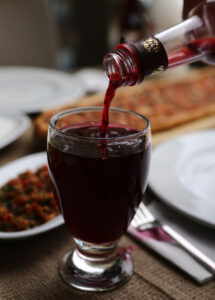
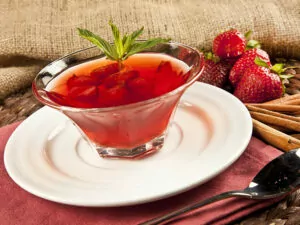
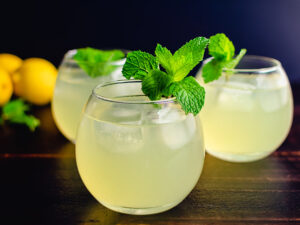

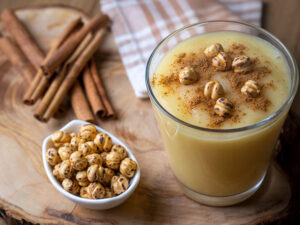


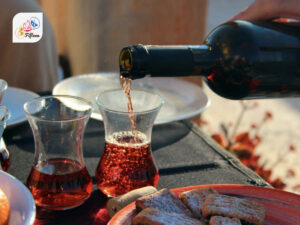
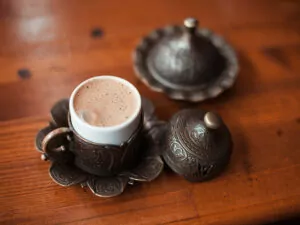
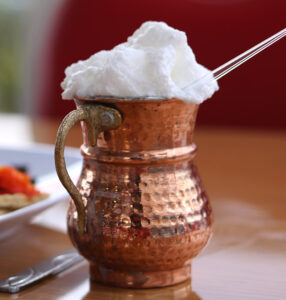
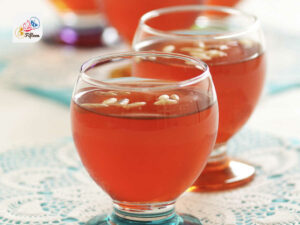
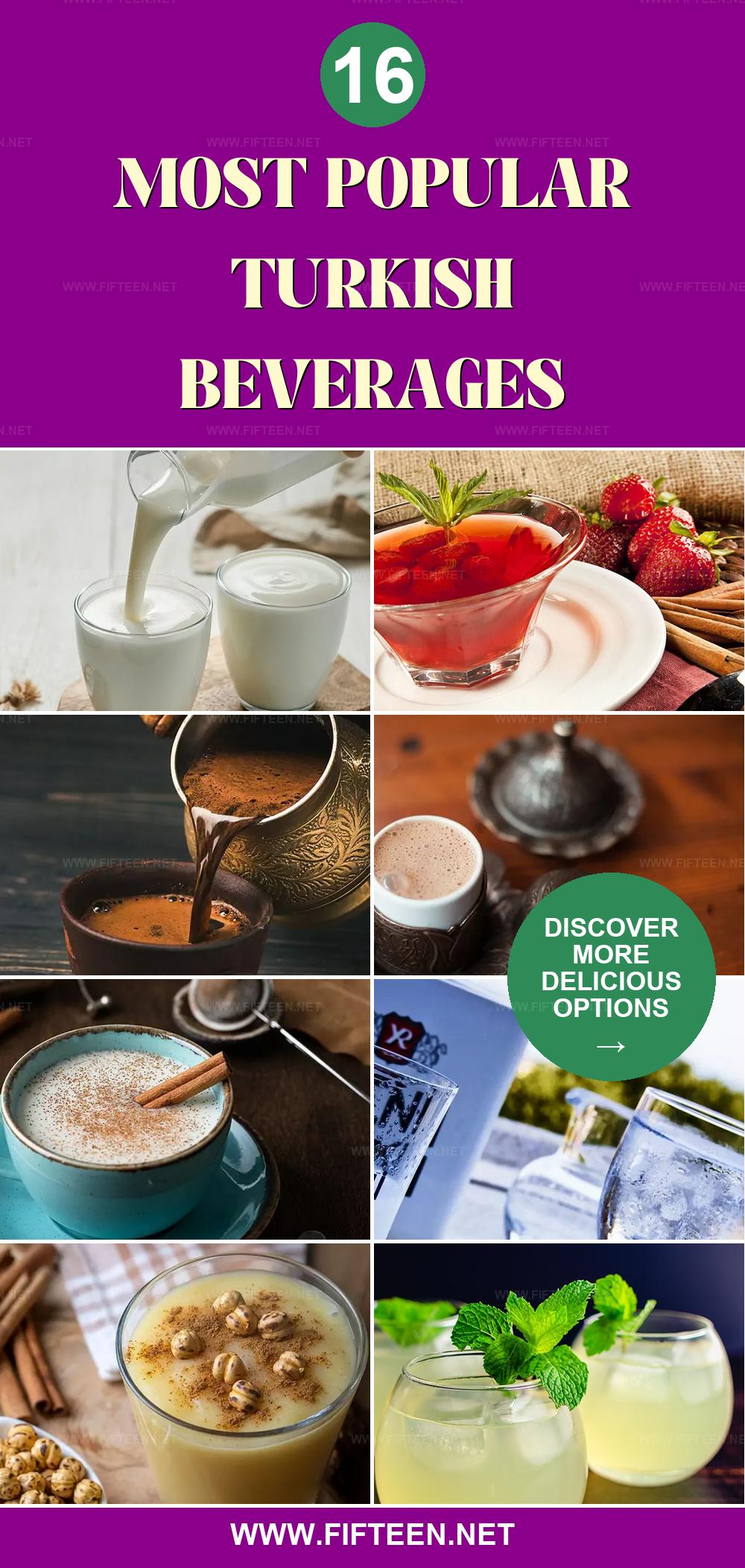
Jamie Scott
Editor in Chief, Senior Content Writer
Expertise
Home Cooking, Meal Planning, Recipe Development, Baking and Pastry, Food Editor, Cooking-video Maker, Western Food Evaluation Expert
Education
Le Cordon Bleu College of Culinary Arts
Local Community College, New York, NY
Jamie Scott is a skilled culinary expert and content creator specializing in Western cuisine. With over 15 years in the culinary field and formal training from Le Cordon Bleu, Paris, Jamie deeply understands how to blend nutrition with delicious flavors. His passion for cooking matches his commitment to making healthy eating accessible and enjoyable.
On Fifteen.net, Jamie brings a fresh perspective to classic dishes and beverages, offering readers insightful recipes, cooking tips, and a fresh view on meal planning that emphasizes taste, health, and simplicity.